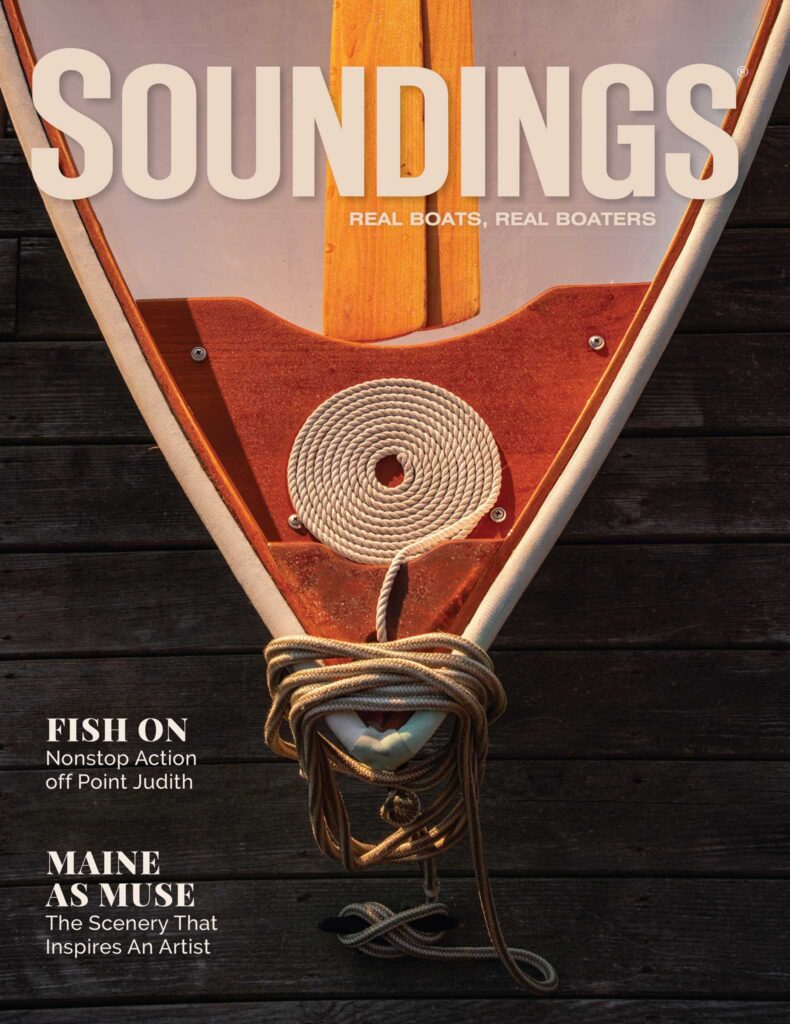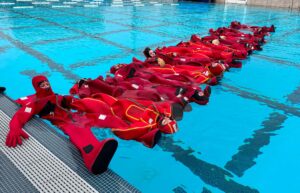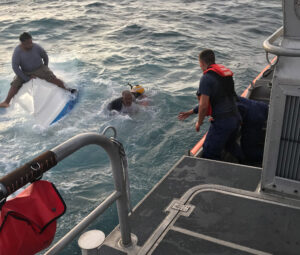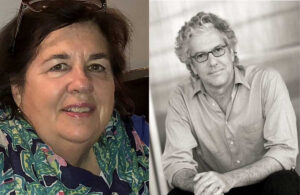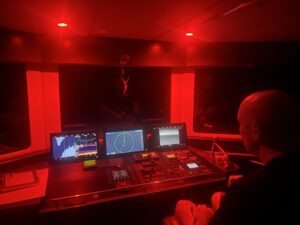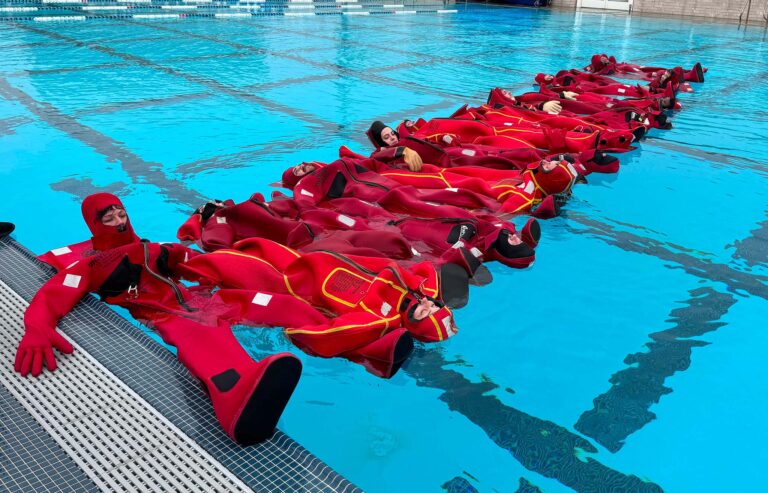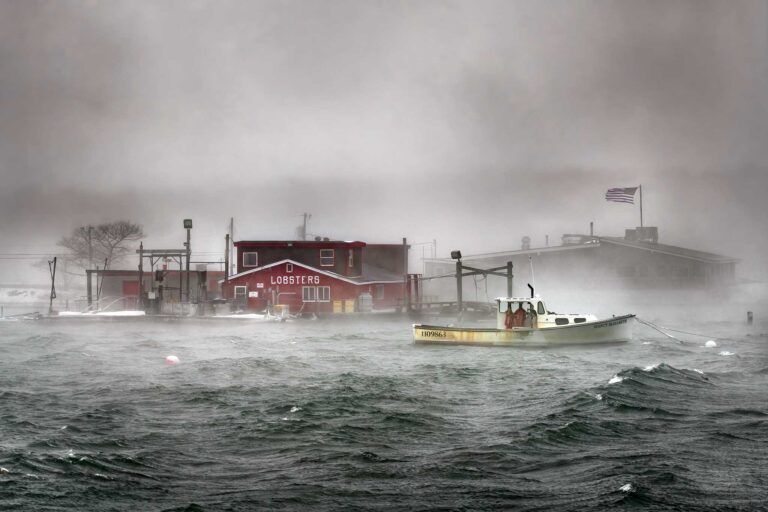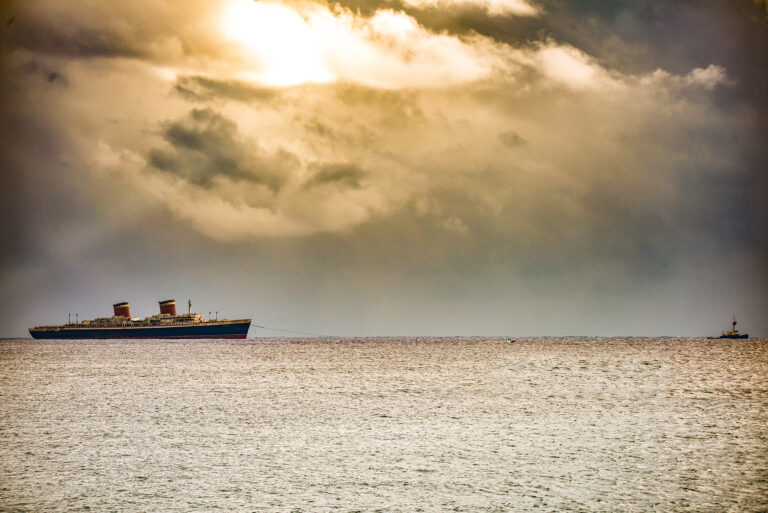As you read this, I’ll be back in Tidewater after a couple of weeks “up ta Maine,” the brokers’ holiday during the summer doldrums. We will be in those hot and sticky weeks that make me wonder why I settled here, especially after a trip to Maine.

I just have to remember that as boats start to come out of the water in New England, the Chesapeake will begin the marvelous season that is fall, with warm days, cool nights and fresher winds as fronts move through. Whether we will have any tropical storms to deal with is anybody’s guess. There was a quote from a meteorologist in the newspaper warning against “hurricane amnesia,” which we get after a couple of years of peace in the Mid-Atlantic. Guess I should get some gas for the generator.
Maine Day at Mile Zero
Off the starboard bow of my desk one morning this summer, my window was filled by a Maine-built warship tended by three Maine-built tractor tugs. Off my port bow I could see the masts of a schooner rising up over the roof of the restaurant in the middle of the marina. I grabbed my camera to record the moment.
The masts turned out to be the Harvey Gamage, built by its namesake yard in South Bristol, Maine. While walking to reach the schooner, I passed a couple of Sabre motoryachts, which are also built in Maine. The Harvey Gamage has been restored to its role as a school ship of Ocean Classroom, thanks to the support of an old friend from Maine, Phin Sprague. I sent Phin the pictures and in return got a phone call about the two ships he owns, the Gamage and Westward, and his plans to create a self-sustaining school ship program under the Ocean Classroom flag.
The Gamage will stop here a couple of times a year. Phin says I’m now its “port captain,” which I think means I will drive the crew around to get groceries next time they put in. I plan to take the job very seriously.
Our own school ship here at Mile Zero, the schooner Virginia, is back in public hands, thanks to its purchase by the city of Norfolk. She is resuming her role as a floating classroom.
Rowing to Enlightenment
A friend here in Portsmouth has access to a Catspaw dinghy, lovingly constructed from a design by Joel White and Nathanael G. Herreshoff. He uses it to relax and teach young folks the joys of rowing a fine small craft. In an era of kayaks and standup paddleboards, facing backward to go forward seems counterintuitive except to a competitive rower. This Catspaw’s home area is the anchorage in Crawford Bay at Mile Zero.
I thought I had learned to row as a kid, but how I really learned to row was as a teenager working at a boys and girls camp in the Adirondacks, which was based out of several fishing camps on the Upper Ausable Lake. The camp ran prior to the general opening of the Ausable Club, which owned the property.
Our supplies had to come up Lower Ausable Lake by human power, in this case in an Adirondack guide boat. I was the engine of the freighter, a 20-foot wooden beauty named Wolf Jaws. Wolf Jaws and I — with 1,000-plus pounds of food and supplies — made many 2-mile runs up and down the lake. The sweeps were long, heavy and overlapping; one learned the technique quickly at the expense of a few jammed fingers. The trips were the closest I came to understanding the meaning of life until Monty Python.
Skylarking
In the anchorage recently was a lovely deep-blue Hinckley Bermuda 40 from 1972, the year I started working for the Maine builder. Depending on when in 1972 that boat was delivered, I could have been on the hull crew that molded it. During the next couple of years I crawled through every nook and cranny of Bermuda 40s and Pilot 35s, doing one thing or another — fiberglass work, plumbing, steering, engine installations, rigging. The five years I spent at Hinckley were the best education a young man could get in the yachting world.
The boat out front was Skylark, its name since the mid ’70s. My last sailboat was a Bristol 41.1, which I also named Skylark after researching all the rules and superstitions surrounding boat naming: seven letters starting with a consonant, birds are always good (except the albatross), pronunciation clear and concise over the radio in a distress situation. It also had so many other layers — a 1941 song by Johnny Mercer and Hoagy Carmichael, the poem by Percy Bysshe Shelley, the bird’s ability to fly and sing at the same time, and, of course, the term skylarking, which is nautical speak for doing anything but your duty, i.e., goofing off. How could I use any other name?
Thou Shalt Sniff Thy Bilges
In mid-June in Virginia Beach a teenage boy went to ride his 1997 personal watercraft, which he had recently purchased with money he saved. He had ridden it several times already, but this time when he hit the starter, the craft exploded. He was lucky and was reported to have no significant injuries. Although we all know the value of a blower — better yet, a good sniff before hitting the start switch — I imagine that I might not have done it every time I jumped on a PWC at age 17, had they been available.
Twice in my boating life I have discovered leaking gasoline on a boat, and both times a sniff in the bilge tipped me off, which is why I am writing deathless prose right now. Both times I was in my teens, and I realize it was my grandfather Fred who had instilled the “fear of gas” in me. Thank you, Grandpa.
I trust you are having a safe summer skylarking and bilge-sniffing, and perhaps you’ll stop by in the fall heading south. It’s never dull here at Mile Zero — see you at the bottom of the Bay, the top of the Ditch.
This article originally appeared in the September 2016 issue.

